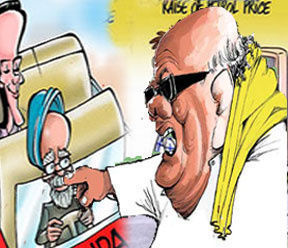Mar 18: Madhya Pradesh Congress Party sought in the Supreme Court on Wednesday that the trust vote in the state assembly be deferred till by-polls for the vacant seats are concluded, saying "heavens are not going to fall" if its government led by Kamal Nath is allowed to remain in office till then.
A bench, comprising Justices D Y Chandrachud and Hemant Gupta, was hearing cross petitions filed by former Madhya Pradesh Chief Minister and senior BJP leader Shivraj Singh Chouhan and MP Congress on the ongoing political crisis in the state after 22 rebel MLAs of the ruling combine purportedly offered to resign.
"Heavens are not going to fall if Congress government is allowed to continue till by-polls and the Shivraj Singh Chouhan's government must not be saddled on the people," said senior advocate Dushyant Dave, appearing for Congress.
"Let them face re-elections and then hold trust vote... You (BJP) have engineered it. My petition raises the frontal attack that you have launched a conspiracy," he said.
Senior advocate Mukul Rohatgi, appearing for Chouhan, vociferously opposed the submission saying that the party which killed the democracy by imposing emergency in 1975 is now referring to "lofty ideals" of B R Ambedkar.
He said that after the resignations of 22 Congress MLAs, out of which six resignations have been accepted, the state government should not be allowed to continue even for a day.
"It is lust of power because of which all these lofty arguments are being made.
"It is unheard of that a person who had lost majority says that he wants to continue for six months and there should be re-election before the trust vote.
Rohatgi said the Kamal Nath government wanted to stay in power by hook or crook.
Earlier in the day, the Madhya Pradesh Congress told the bench that a probe is needed on the resignation letters of its rebel MLAs that have been submitted by BJP leaders to the Speaker of the state Assembly.
Dave said the Governor has no business to send messages at night asking the Chief Minister or Speaker to hold floor test.
"The Speaker is the ultimate master and the Madhya Pradesh Governor is overriding him," he said.
The party alleged that resignations of its rebel MLAs were extracted by force and coercion and they did not act as per their free will.
It also said that its rebel MLAs were taken away in chartered flights and are currently incommunicado in a resort arranged by the BJP.
The advancing of arguments will resume after lunch.
The Madhya Pradesh Congress Legislature party (MPCLP) had Tuesday moved the Supreme Court seeking direction to the Centre and the BJP-led Karnataka government to grant it access to communicate with its rebel MLAs allegedly kept at Bengaluru.
Earlier on Tuesday, the court had asked the Kamal Nath government in the state earlier in the day to respond by Wednesday to a plea by senior BJP leader Shivraj Singh Chouhan seeking immediate floor test in the Assembly.
MPCLP, in its plea filed by Govind Singh, an MLA and chief whip of Congress legislature party, urged the apex court to declare as illegal the action of the Centre, Karnataka government and the MP BJP of illegally confining its MLAs in Bangaluru.
The plea, filed through senior lawyer Devdutt Kamat, said the trust vote would be a "sham" if 22 MLAs did not take part in it as almost 10 per cent of constituencies go unrepresented.
The plea filed by Chouhan and nine BJP lawmakers was moved in the top court just after the Speaker cited coronavirus concerns and adjourned the House till March 26 without taking the floor test apparently defying the directions of Governor Lalji Tandon.
The plea alleged that the Speaker, the Chief Minister and the Principal Secretary of the Assembly have "flagrantly violated the constitutional principles and have deliberately and wilfully defied the directions" issued by the governor asking the government to prove the majority on the floor of the house on March 16 when when the budget session was to commence.
On Saturday night, Tandon wrote to Nath asking him to seek a trust vote in the Assembly soon after the Governor's address on Monday, saying his government was in minority.
After the Speaker accepted the resignation of six Congress MLAs on Saturday, the party now has 108 legislators.
These include 16 rebel legislators who have also put in their papers but their resignations are yet to be accepted.
The BJP has 107 seats in the House, which now has an effective strength of 222, with the majority mark being 112.







Comments
Add new comment